
Election fervour grips Bhutto supporters
by M Ilyas Khan
Ali Bukhsh, a resident of Pakistan's southern Sindh province, says he
has two passions in life.
One is his belief in mystical Islam. He has devoted his life to
serving pilgrims at the shrine of Sindh's most popular saint, Lal
Shahbaz Qalandar.
The other is his love for the Pakistan Peoples Party (PPP), the
country's largest political grouping.
This feeling is shared by many people in Sindh, a province known both
for its powerful feudal lords and for the shrines of some of the oldest
mystic saints of the Indian subcontinent.
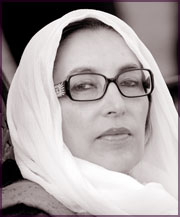
In December, the assassination of PPP chief Benazir Bhutto sparked
riots across the country, bringing life to a complete halt for more than
three days.
Sindh, her native province, was the worst hit.
Weeks later, popular grief and anger seem to have been transformed
among Ms Bhutto's supporters into a desire to defeat the ruling PML-Q
party, which they blame for her assassination, at polls due on 18
February.
During a recent 900km drive around some districts of upper Sindh, I
got a feeling that election campaigners from the parties other than the
PPP had simply lost touch with the people.
Low turnout
In four districts that I crisscrossed in two days, I did not see a
single election office set up by the PML-Q candidates, and only a few
billboards for the party in areas where powerful landowners opposed to
the PPP can establish their writ.
But the PPP flags were everywhere, and every other man on the street
appeared to be a PPP supporter.
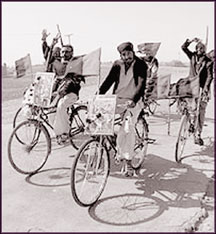
Sahib Khan and Mohammad Salim, both in early 20s, are two such
people. Farmers from Moro town, they both cycled for two days across a
170km stretch to reach Ms Bhutto's native Garhi Khuda Bukhsh village for
her chehlum - the 40th day when the period of mourning for a deceased
person comes to an end.
They were bracing themselves for the return journey, just as strong
icy winds begin to lash the land.
"We will be alright," says Sahib Khan. "Benazir gave her life for us.
We will give our life for her."
Will these sentiments translate into votes in a country where voter
turnout has ranged between an abysmal 30% and just a little over 40% in
the past?
When the election schedule was announced in November, critics said
the arrangements could lead to a low voter turnout.
Backlash
The first dampener for voter interest came when President Musharraf
appointed an interim government of mostly PML-Q sympathisers to oversee
the elections.
Secondly, he declined to concede the opposition's demand to suspend
district governments, most of which are controlled by the PML-Q
appointees.
Opposition demands for an independent election commission were also
brushed aside. The result, critics said, was an institutional structure
heavily tilted in the PML-Q's favour.
Local election observer groups have pointed out several instances of
patronage being extended to the PML-Q candidates by both the interim
government and the district governments.
The election commission has no powers to enforce rules and has only
been acting as a post office between the complainants and government
departments. Before Ms Bhutto's assassination, there were also reports
of the intelligence agencies pressuring PML-Q opponents in Punjab and
Sindh to drop out of the contest or change parties.
But the countrywide backlash that followed her death and the
international pressure it brought to bear on the government seem to have
changed the dynamics of the situation. Scare
For one, army chief Gen Ashfaq Pervez Kayani has publicly ordered
military officials not to indulge in politics.
The polling officials, most of whom are thought to be PML-Q
appointees, are also likely to be under pressure to conduct the election
in a transparent manner.
As hopes grow for a competitive election, voter interest has been
revived, creating a chance that a single party may win a clear majority.
But observers point out that several recent incidents of firing on
election gatherings in Punjab may be designed to scare voters. In
Karachi, the capital of Sindh, the recent killing of two ethnic Pashtun
student leaders within a week is being seen as an attempt to pit
Pashtuns against the Urdu-speaking people.
Whatever the impact on other voters, saint Lal Shahbaz Qalandar's
mystic servant, Ali Bukhsh, says he will not be affected.
"I did not vote in the 2002 elections because it was no use. The
government was planning to rig them," he says.
But this time it is different.Come 18 February, he intends to take a
60km bus ride to his home town, Mehar, where he is registered to vote.
BBC
Ch vez threatens to end oil exports to U.S. in Exxon feud
by SIMON ROMERO
Caracas, Venezuela: President Hugo Ch vez threatened Sunday to halt
oil exports to the United States if the oil giant Exxon Mobil succeeds
in freezing billions of dollars of foreign petroleum assets controlled
by Venezuela.
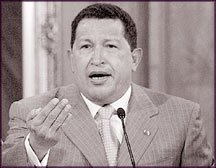
The warning ratchets up a fierce legal dispute between Venezuela and
Exxon after Mr. Ch vez's move to exert greater state control over the
nation's oil industry last year.
Rather than submitting to Venezuela's terms, Exxon withdrew from a
major production venture, intensifying the feud.
"The bandits of Exxon Mobil will never rob us again," Mr. Ch vez said
in comments broadcast Sunday on his weekly television program. He
accused Exxon, one of the largest publicly traded oil companies, and the
United States of mounting a conspiracy to destabilize Venezuela.
"I speak to the American empire, because that's the master," Mr. Ch vez
said. "Continue, and you will see that we won't send one drop of oil to
the empire of the United States." Referring to Exxon, he said, "They are
imperialist bandits, white-collar criminals, corruptors of governments,
overthrowers of governments."
Venezuela's government has been seething since Exxon recently won
orders in British, Dutch and American courts freezing as much as $12
billion in Venezuelan oil assets abroad - refineries and other
oil-related infrastructure that Venezuela owns. Venezuela vowed to
overturn the decisions before arbitration over Exxon's attempts to win
compensation for its nationalized oil project.
"We have no comment," said Margaret Ross, a spokeswoman for Exxon,
based in Irving, Tex., after Mr. Ch vez spoke.
Mr. Ch vez has repeatedly threatened to cut off oil supplies to the
United States, but has never done so.In fact, despite a deterioration in
political relations, the United States remains Venezuela's top trading
partner.
Venezuela is the fourth-largest supplier of crude oil to the United
States, sending 1.2 million barrels a day to American refineries,
according to the Energy Information Administration in Washington.
The dispute with Exxon is focusing attention on Petróleos de
Venezuela, the national oil company, which Mr. Ch vez has purged of his
political opponents and reconfigured to finance social welfare projects.
The company faces steeper borrowing costs after the price of its
bonds plunged by 3 percent on Friday, to 66.75 cents on the dollar.
Declining oil production at Petróleos de Venezuela has allowed other
countries in the OPEC oil cartel, notably Saudi Arabia, to gain a
greater share of the market in meeting the expanding global demand for
oil.
The problems at Petróleos de Venezuela, a major revenue source for
Mr. Ch vez, are occurring amid growing discontent over food shortages
and galloping inflation.
The tension with Exxon was just one of Mr. Ch vez's subjects on
Sunday.
He also accused the United States and neighboring Colombia of
bringing paramilitary squads to Venezuela to traffic in weapons and
cocaine.
And he said his political opponents were plotting to "reconvert
Venezuela into a North American colony."
The New York Times
Medical staff told not to reveal foetus gender
Manama, Bahrain: Health authorities have ordered medical staff not to
reveal the gender of foetuses to pregnant mothers, sources told Gulf
News on Sunday.
They made the decision after doctors discovered that information they
supplied about the gender led several pregnant women of Arab origin to
abort their female foetuses.
"These pregnant women became anxious after doctors treating them told
them that they had female foetuses. They were very concerned about the
reactions of their husbands who wanted to have sons," the sources said.
"Revealing the gender of the foetus is strictly prohibited," a sign
posted at a health centre in East Riffa, south of Manama the capital,
read, without giving an explanation.
Dr Abdul Hussain Al Ajmi, head of the medical services for
healthcare, said his directorate did not issue any note to doctors about
not to reveal the gender of the foetus. "The decision could have come
from another directorate, but definitely, it was not from ours," he
said.
Dr Al Ajmi said he did not receive any complaint from fellow doctors
about the selective abortions.
Abortions are not allowed in Bahrain and the few exceptions are
performed under strict religious regulations when the foetus has been
found to be deformed, or with a congenital defect detected through
ultrasound, amniocentesis, or other tests.
Preference for sons
Abortions can also be performed if the pregnancy poses a threat to
the life of the mother, and early deliveries are done if the woman has
life-threatening conditions. Several Arab countries prefer the birth of
sons to daughters for economic and cultural reasons.
Sons are viewed as more able to provide for their families,
particularly in rural areas where men do most of the manual work to
support the relatives and elderly parents. Boys also enjoy a special
status to carry the family line and to protect its honour. Abortions are
not allowed in Bahrain and the few exceptions are performed under strict
religious regulations.
Gulf News, U.A.E
Turkey divided over headscarf ban
by Sarah Rainsford
Turkey's parliament has voted in favour of overturning a ban on the
Islamic headscarf in universities.
The government argued that changing the constitution was crucial to
ensure all women had equal access to a higher education.
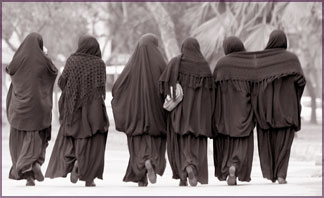
But far from offering a definitive solution, this ruling threatens to
cause chaos. Women have been banned from covering their heads in all
state offices and institutions in Turkey for decades.
It is part of the strict division between religion and politics in a
country where at least 99% of the population is Muslim.
In the 1980s the headscarf was also prohibited at all universities,
declared a symbol of political Islam.
Turkey's current government, led by religious conservatives, has long
pledged to overturn that.
But it is a highly controversial and divisive issue.
'Stay secular'
As parliament met to vote last Saturday tens of thousands of
protesters jammed the streets of the capital. Muslims - demonstrating
against the Islamic headscarf.
Many were women who fear that relaxing the rules on the headscarf is
a first step towards increasing the influence of Islam on society.
They see it as a serious threat to their own non-religious way of
life - changing the face of modern Turkey.
"Turkey is secular and will stay secular!" they shouted, turning the
whole area bright red with thousands of national flags.
"We consider [wearing the headscarf on campus] not as a right, but as
imposing religious beliefs into our laws, our constitution," insists
Ural Akbulut, rector of Ankara's prestigious METU university.
A portrait of Mustafa Kemal Ataturk - who founded Turkey as a secular
Republic - looks down from the wall of his wood-panelled office.
"We say that will damage secularity. Once you do that, you damage
democracy," the professor explains.
"Secularism is like a diamond. Once it has a defect, its worth is
halved." His view is shared by Turkey's powerful secular establishment,
including the military. It was to safeguard secularism that the generals
forced from power a government they deemed too Islamist a decade ago.
The headscarf ban in universities began to be strictly enforced after
that. But for some students that translates into a daily humiliation.
Rabia reads history at METU and has to remove her scarf every day
before she arrives on campus.
She wears a wig instead, but says she has been hounded out of a
lecture hall in the past even for that.
"I think people should learn that we are human beings too. We have
the same feelings as they do," Rabia complains.
"I think they should get rid of their prejudice."
Another friend went abroad to study rather than remove her scarf,
which she calls an expression of her personal faith.
"It is a baseless phobia, there is nothing to be scared of," she
argues, dismissing talk that the scarf is a subversive symbol.
"It is a question of freedom." That is how the governing AK party
explains its efforts to reverse the ban, in a country where two thirds
of women cover their heads.
"If tens of thousands demonstrated against this reform, then 19
million 999 thousand support it," argues AK Party MP Yasar Yakis.
"The injustice is there. The problem had to be solved," he says.
Legal challenge
The government argues its constitutional changes now secure the legal
right for women to study with covered heads, should they want to. "We
believe that what is expected from us politicians has been done," says
Mr Yakis and suggests the next step is down to the universities
themselves.
"Those who implement the law should see that this is the will of the
people, and adjust their approach accordingly," he argues.
But the reformed articles of the constitution stop well short of
mentioning the Islamic headscarf outright.
The government's proposal to do that in addition - in the Higher
Education law - is even more controversial, and currently on hold.
Turkey's main opposition party has pledged to challenge all the legal
changes in the constitutional court.
And in the meantime prominent university rectors have declared they
will continue to refuse covered girls access to campus.
"Our right to a higher education in the headscarf is now secured by
law. The ban has no legal basis," argues Fatma Benli, a lawyer and
pro-headscarf activist.
But she believes that is irrelevant when the issue is a political
one, like this, not a legal one.
"University rectors see themselves as above the law. They refuse to
take the girls in, and that is the end of the discussion."
After weeks of fierce debate - on the streets, and in the media -
passions on both sides are running high.
There are already signs of increased polarisation and tension.
If students decide to put the new laws into practice some predict
that could spill over into open confrontation.
"Girls will try to force their way in, faculty members will keep them
out," argues Mr Akbulut.
"This will cause turbulence and conflict."
In this climate it seems unlikely many girls will attempt to test the
system just yet. But round one in this landmark fight is over. All eyes
are on the constitutional court now, for its verdict.
BBC
Manila women fight contraception ban
by Philippa Fogarty
Twenty of Manila's poorest residents have filed a legal challenge
against what they say is a ban on contraception.
The group - 16 women and four of their husbands - are fighting a
policy which they say denies them access to condoms, to the pill and
other effective forms of family planning.
|

The Roman Catholic Church is very influential in the
Philippines |
This has had a devastating effect on their lives, they argue, causing
unwanted pregnancies, pushing them further into poverty and harming
their health and wellbeing.
The case has sparked debate in the Philippines where, says Professor
Michael Tan, chair of the anthropology department at the University of
the Philippines, there is no national policy on family planning.
More than 80% of Filipinos are Roman Catholics and the Church is
hugely influential. Abortion is banned and President Gloria Arroyo
openly backs the Church's anti-contraception stance.
Previous attempts to pass laws requiring government funding for
services like family planning and Aids prevention have been blocked by
conservatives, Mr Tan says. This has left crucial decisions in the hands
of local officials and resulted in a very mixed picture nationwide - so
this case is very significant.
"People recognise that the courts must decide once and for all
whether local government officials can unilaterally ban family planning
services," he said.
'Culture of life
The policy at the centre of the controversy was introduced in
February 2000 by the then Manila City Mayor Jose Atienza, a staunch
Catholic.
He backed "natural" family planning - a less reliable method which
involves couples not having sex when the woman is at her most fertile -
and called the use of alternative contraceptives "a very, very
destructive practice which ruins Filipino values".
|
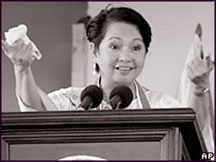
President Arroyo says that natural family planning is best
for Filipinos. |
Mr Atienza passed Executive Order 003, which "upholds natural family
planning not just as a method but as a way of self-awareness in
promoting the culture of life while discouraging the use of artificial
methods of contraception".
Although carefully worded to avoid an outright prohibition on
"artificial" contraception, it was interpreted as such by city health
officials, campaigners say.
Condoms and pills - which had been free - disappeared from local
health centres. Hospitals turned down requests for sterilization
operations. Many health workers stopped providing any information
whatsoever on contraception.
Some family planning services did remain available at government-run
hospitals or in other districts of the sprawling capital which did not
fall under Mr Atienza.
But these services came at a price, people had to travel to get them
and many simply did not know where to go. NGOs who tried to fill the gap
reported harassment by city officials.
Lawyers for the group - from Philippine-based rights organisations
LIKHAAN and Reprocen, and the US-based Center for Reproductive Rights (CRR)
- argue that EO 003 has caused "serious and lingering damage" to
residents.
The policy has hit poorest people the hardest, they say, forcing
people to choose between a packet of pills or food for their families.
Several of the petitioners have had many more children than they
wanted - some at the expense of their health - because they could not
afford to pay for contraception. The policy also exposed women to
violence from husbands who did not want to abstain from sex, the rights
groups found in an earlier report, and meant more women were resorting
to illegal and unsafe abortions.
Mr Atienza is no longer mayor - he is now secretary for the
Department of Environment - and his replacement Alfredo Lim is currently
looking at the issue. But EO 003 remains in place and there are no plans
to start providing free contraceptives again - not even condoms for sex
workers.
"The city will not use funds for the procurement of contraceptives -
not when we have a budget deficit of more than 1bn pesos," said Dr Gina
Pardilla of Manila City health department. "We need the money for other
social and health needs."
The plaintiffs argue that EO 003 violates the constitution - which
gives couples the right to plan a family in accordance with their
beliefs - as well as several international conventions to which the
Philippines is a signatory.
Similar orders have been enacted in two other areas, which is why
Elizabeth Pangalangan, Reprocen director and a lawyer for the
petitioners, says it is important that the case sets a legal precedent.
"We want to say that this cannot be done in Manila or anywhere else,"
she said. The group will take their case to international courts if
necessary. Success in the courts would be welcomed by a silent majority,
Professor Tan said, citing surveys which show most Filipinos want access
to family planning.
"Demand is very clear, but the problem is that the Catholic Church
works on the supply side, getting to politicians like Mayor Atienza and
threatening them with the so-called Catholic vote."
A court decision might also embolden government officials to
implement nationwide policies, he said.
"The Department of Health is currently held hostage to the views of
Arroyo - officials fear that they will lose their jobs if they promote
family planning."
"A court decision would free people by taking away the Sword of
Damocles hanging over them."
BBC |
